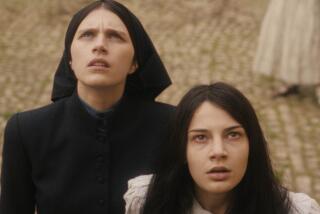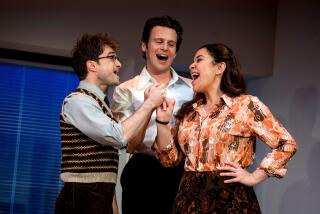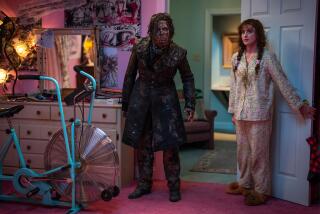Review: Sally Hawkins and Ethan Hawke inhabit drama ‘Maudie’ with hard-earned love
Sally Hawkins turns a crumpled misfit into an affecting figure of fortitude and optimism in “Maudie,” a portrait of the artist as a hermit wife that overcomes some clunky early brushstrokes to achieve a genuine grace and considerable poignancy.
Though “Maudie” is a decades-spanning biography of Nova Scotia folk artist Maud Lewis, who died in 1970, in the hands of Hawkins, screenwriter Sherry White and director Aisling Walsh, it plays more like a fractured fable of fulfillment and unexpected romance. That’s partly because Maud’s insulated existence — spent mostly in a shed-sized cottage with her taciturn husband, Everett (a riveting Ethan Hawke) — hardly lends itself to your typical timeline-hopping Great Lady narrative.
This is quiet portraiture, the story of an unappreciated oddball who found herself by making art and, in doing so, turned a hard-bitten man into a loving partner and drew the outside world to her modest, colorfully decorated door. (Even Richard Nixon, then vice president, bought one of her paintings; she wanted the payment mailed first.)
As it gets going, however, “Maudie” worryingly suggests something saccharine, of the cute-outcast variety. Earning mostly scorn from her beleaguered, caretaker aunt (Gabrielle Rose) and shady brother (Zachary Bennett), Maud is introduced to us as a small-town-isolated bundle of awkwardness, save the occasional burst of wry humor and defiance. Her specific affliction goes unmentioned until later, when rheumatoid arthritis is referenced, but Hawkins’ limping, chinless, shrunken physicality and halting, girlish rasp as a thirtysomething woman-child aching to be independent initially carry the unfortunate overtones of a TV movie.
But then she answers an ad at the general store for a live-in housemaid, and we’re introduced to brutish recluse Everett, a local fisherman and scrap dealer with a cantankerous pride in his self-made, secluded ways, who lives with no electricity or running water. It’s a tense arrangement for a long-pitied woman straining for adulthood and a stony man set in his ways, one made no easier by their sharing the same bed in his cramped attic.
Compromises are made. When his needs get biological, her counteroffer is marriage. When she turns to her self-taught painting — on the walls and on leftover particle board — he reluctantly accepts. And when her brightly colored, simple nature scenes attract a nearby art dealer (Kari Matchett), the extra money (and her bookkeeping skills) adds a further equanimity to their partnership. Eventually, love settles in.
Between Everett’s blunt insistence on traditional gender roles and Maud’s patient long-game to blur those lines and fill the space with who she is — literally too, since their painted house is now on display at an art gallery in Halifax — “Maudie” is like a charmingly cracked domestic play about waiting the other person out. As she blossoms — just enough, not too much — he grunts and softens, just enough, not too much. Unlike the thick directness in Maud’s work, the movie about her is almost pointillist in detailing the tiny steps that make up an enduring marriage.
Walsh’s greatest asset is her two leads, and she knows it, her usually fixed camera as attendant to their performance needs as the Lewises’ front window was for Maud’s inspiration. (“The whole of life already framed, right there,” she says.) The years have conditioned us to expect Hawkins to bring an eccentric to vivid life, and she does here with precision and soul.
The trickier role is Hawke’s. But with a gardener’s sensitivity he nurtures Everett through bitter, occasionally abusive masculinity toward a place of surprising care and love. Though Hawkins and Hawke look nothing like the people they’re playing — as unfortunately shown at the end with archival footage, the kind of documentary gilding in biopics I always feel is a disservice to the actors — they live inside the movie with unforced authority.
The later years bring with them the inevitable ache of age, regret and loss — and even a heartbreaking revelation regarding a tragedy from Maud’s early life — but the burnished glow of a hard-earned comfort still remains. “Maudie” takes the gnarled hand of its subject, and the deep satisfaction of created art, and finds more to connect the two than just a dipped paintbrush.
-------------
‘Maudie’
Rated: PG-13 for some thematic content and brief sexuality
Running time: 1 hour, 57 minutes
Playing: The Landmark, West L.A.; and ArcLight Hollywood
See the most-read stories in Entertainment this hour »
Movie Trailers
More to Read
Only good movies
Get the Indie Focus newsletter, Mark Olsen's weekly guide to the world of cinema.
You may occasionally receive promotional content from the Los Angeles Times.






